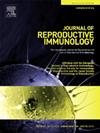Metabonomics analysis of decidual tissue in patients with recurrent spontaneous abortion
IF 2.9
3区 医学
Q3 IMMUNOLOGY
引用次数: 0
Abstract
Objective
This study aimed to delineate the metabolic differences and identify enriched pathways in the decidual tissue of patients with recurrent spontaneous abortion (RSA) compared to normal pregnant women.
Methods
A cohort of 25 RSA patients and 25 normal pregnant women was recruited for the study. Non-targeted metabolomic analysis of decidual tissue was conducted using high-performance liquid chromatography coupled with mass spectrometry (HPLC-MS). Principal component analysis (PCA) and orthogonal partial least squares discriminant analysis (OPLS-DA) were employed to identify differential metabolites. Pathway enrichment analysis was performed using the Kyoto Encyclopedia of Genes and Genomes (KEGG) database to elucidate associated metabolic pathways. Quantitative polymerase chain reaction (qPCR) was utilized to assess the expression levels of key proteins related to these pathways, including acyl-CoA synthetase long-chain family member 4 (ACSL4), glutathione peroxidase 4 (GPX4), and indoleamine 2,3-dioxygenase (IDO).
Results
A total of 54 metabolites were identified with significant differences between the decidual tissues of RSA patients and normal controls, corresponding to 29 significantly enriched metabolic pathways (P<0.05). The expression of ACSL4 was markedly upregulated, while the expression of GPX4 and IDO were significantly downregulated in RSA patients (P<0.05).
Conclusions
This study elucidates substantial metabolic disruptions in the decidual tissue of RSA patients, identifying 54 differential metabolites and 29 enriched pathways. The altered expression of ACSL4, GPX4, and IDO underscores their potential involvement in the pathogenesis of RSA. These findings provide critical insights into the metabolic mechanisms underlying RSA and suggest promising targets for diagnostic and therapeutic interventions.
复发性自然流产患者蜕膜组织的代谢组学分析
目的 本研究旨在确定复发性自然流产(RSA)患者蜕膜组织与正常孕妇蜕膜组织在代谢方面的差异,并识别富集途径。采用高效液相色谱-质谱联用技术(HPLC-MS)对蜕膜组织进行非靶向代谢组学分析。采用主成分分析法(PCA)和正交偏最小二乘判别分析法(OPLS-DA)来鉴定差异代谢物。利用京都基因和基因组百科全书(KEGG)数据库进行了途径富集分析,以阐明相关的代谢途径。利用定量聚合酶链反应(qPCR)评估了与这些通路相关的关键蛋白的表达水平,包括酰基-CoA合成酶长链家族成员4(ACSL4)、谷胱甘肽过氧化物酶4(GPX4)和吲哚胺2,3-二氧化酶(IDO)。结果 共鉴定出54种代谢物在RSA患者和正常对照组的蜕膜组织中存在显著差异,对应于29种显著富集的代谢通路(P<0.05)。在 RSA 患者中,ACSL4 的表达明显上调,而 GPX4 和 IDO 的表达则明显下调(P<0.05)。ACSL4、GPX4和IDO的表达改变强调了它们在RSA发病机制中的潜在参与。这些发现提供了对RSA基础代谢机制的重要见解,并为诊断和治疗干预提出了有前景的目标。
本文章由计算机程序翻译,如有差异,请以英文原文为准。
求助全文
约1分钟内获得全文
求助全文
来源期刊
CiteScore
6.30
自引率
5.90%
发文量
162
审稿时长
10.6 weeks
期刊介绍:
Affiliated with the European Society of Reproductive Immunology and with the International Society for Immunology of Reproduction
The aim of the Journal of Reproductive Immunology is to provide the critical forum for the dissemination of results from high quality research in all aspects of experimental, animal and clinical reproductive immunobiology.
This encompasses normal and pathological processes of:
* Male and Female Reproductive Tracts
* Gametogenesis and Embryogenesis
* Implantation and Placental Development
* Gestation and Parturition
* Mammary Gland and Lactation.

 求助内容:
求助内容: 应助结果提醒方式:
应助结果提醒方式:


